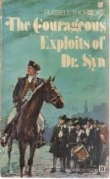
Текст книги "Red Jungle"
Автор книги: Kent Harrington
Жанр:
Триллеры
сообщить о нарушении
Текущая страница: 8 (всего у книги 20 страниц)
He knew then that he was the one that would have to make them follow the rules, that she wouldn’t be able to, that passion would get the better of her. He felt the milky feel of her, the brush of her thigh, the pulling of his hair, the moaning and rocking as she came again. He was a little shocked by her eagerness as she pulled his pants down and made love to him, looking up at him with her blue eyes full of lust while he looked at the volcanoes, the window wide open, the fishermen gone, just the flat water and the feeling of her mouth on him using quick little strokes, the sound of it. The three volcanoes, each one watching them. Before he climaxed, he realized—in the ecstasy—that it was this thing, this affair, that was the last great jungle in which he could lose himself. This was exactly what he’d been searching for, without realizing it. It was the kind of madness that made him trade stocks until he’d lost everything. He’d wanted to give up his self, the great monolith of his personality; he’d wanted to smash it, to pulverize it and walk away somehow different, or dead.
They both heard the helicopter. He’d fallen asleep. He panicked. For a moment, he couldn’t move.
FOURTEEN
He made the mistake of standing up. The helicopter flew low over the lake in front of his window. He knew it must be Carlos. He looked and saw the little Boston Whaler sitting down on the water, looking tiny by the dock. The lake was suddenly whipped up into a green-blue froth. He sat down again immediately.
He was naked. He turned and looked at Beatrice; she was only in her bathing suit top. They’d lost control completely. He didn’t understand it. They’d known he was coming.
She reached for him. He could see real terror on her face. “I told him you were staying here,” she said. She wouldn’t let go of him. He had to pull her arms from his shoulders. “He’s going to find us. He’ll shoot us. Oh my God! My kids.”
He pulled her arms down and slapped her. He didn’t know what else to do. She looked at him a moment, and nodded. Her cheek was bright red where he’d hit her.
“Get dressed,” he said. He stood up and pulled the curtain closed. The room was plunged into semi-darkness. His mind was racing for an idea, any idea. Nothing came. They both dressed frantically.
“What’s he usually do when he gets here?”
“He calls me. I come and pick him up. He’s going to—” One of the cell phones on the dresser rang. It was hers. They looked at each other. She was wrapping the sarong around her hips. He was pulling his pants on.
“He’ll have seen the boat,” she said.
“Pick it up and tell him you’ll meet him in the bar. Go ahead! Tell him you went for a walk in the garden.” She looked at him.
“He’ll know something’s wrong. I’m frightened.”
“Don’t be,” he said. “Everything’s all right. It’s going to be fine. He isn’t going to find out. He is going to get in the boat with you. Then you are going to take him wherever it is you go.” Her phone stopped ringing. “Now call him back.”
“Shit. I’m shaking, Russell.”
He walked across the room, picked up her phone, and took it to her. She sat down. “Please call him back. If you don’t, he might think something is wrong.” He held the phone out to her. She took it, finally.
She stood up, went to the curtains and opened them slightly. He walked up behind her and looked down on the heliport. Two Bell helicopters were parked near one another. He saw Carlos Selva on the stairs, heading toward the pool. In full dress uniform, he was talking—briefcase in his hand—to one of his bodyguards. He could see the general’s cell phone cradled in his shoulder. Beatrice’s phone rang again. She opened it.
“Hello. Darling… Yes… I’m in the garden in the back by the parrots. Yes… I know it’s silly, but I like them. No, I’ll meet you in the bar. Right now. Yes—No, I wanted to be here when you came. I don’t know… I can check. Why don’t you? The American. No. Yes, he’s here. Yes, right now,” she said. He watched her husband move up the stairs, flanked by his two men. He was walking slowly. Russell knew that if he decided to look for her outside, they were going to be caught.
He rushed out of the room and started to run down the corridor. He looked down at his feet; he hadn’t put on shoes. He ran, tucking in his shirt. He didn’t think that he’d closed the door to the room. Carlos was going to surprise her in the garden; he felt it. It was the way Carlos had looked around as he spoke. It was only natural for a man to do that. He flew down the corridor. God damn it, all the rules and now this.
He stopped for moment in the lobby. He was breathing hard and sweating. He wiped his face. He looked for Carlos on the terrace and saw him doing exactly what he’d feared. He waited a moment, pulled his shirttails out again and wiped his face off. He told himself that he had to be calm, that he would walk out the side door and intercept the man.
He was lost. His room was on the other side of the hotel. I was lost. My room is on the other side of the hotel. He repeated it again and again as he walked across the lobby and out the door to the garden. He saw Carlos coming down the path towards him. He was alone now.
Russell smiled at Beatrice’s husband. Carlos looked at him, nonplussed at first, then smiled back, recognizing him.
“Damn Guatemalans,” Russell said. He didn’t know why he said it. Pure nerves.
“Mr. Price. I was just asking about you.”
“I’m lost. Can you believe it?” he said, and smiled. “I thought my room was this way. But I don’t think it is.”
“I’m so glad you could come,” Carlos said. “Have you seen my wife?”
“Wife? This morning. We had part one of the interview. I’m afraid I was feeling a little under the weather. Damn food here. Your countrymen are always poisoning me. I had to lie down, don’t know where she is. She said you were coming by helicopter. Wish I had.”
He told himself to shut up. It was difficult; he was trying to bury Carlos with bluster.
“Are you all right?” Selva asked.
“Well, if puking your guts out is all right, then I suppose I’m fine,” Russell said.
“I’m so sorry. Can I get you something? I can send one of the men down to the town for you. To the farmácia.”
“Would you? God! Yes, I was just trying to buy something here, but there’s nothing,” Russell said.
“Yes. Of course. I can send a doctor too, if you like?” Carlos said.
“Doctor? No. No. Just something that will put a cork in it.”
“Of course. Let me call my wife and tell her.”
Russell held his stomach. “If you don’t mind, I think I could use something right away.”
“Of course. I’m sorry. Sit down . . . or go to your room. What’s the room number?”
“1211,” Russell said.
“1211. I’ll have my wife go up and see what they can bring you. Why don’t you go to the room, and we’ll have some tea sent up. Yerba Buena is excellent for the cramps. I’m sure they have it.”
He’d come up and stood by Russell, genuinely concerned. Carlos put his briefcase down. They shook hands, then Russell watched him call Beatrice. He asked her to go to room 1211, and told her the American journalist was with him in the lobby and had fallen ill.
Russell could finally breathe. It had worked. Carlos went out to the hotel’s entrance where he’d stationed his bodyguards.
“He’s coming here,” she said. Russell walked back into the room. The curtain was pulled open. He pulled the bed cover up and looked at her. “I’m so sorry. I don’t know why I came up here. I was afraid you would leave,” she said. “I need you so much.”
He looked at her. He didn’t understand the last two hours, the way they had both flouted the danger, but he knew they had to get through the next thirty minutes. He looked around the room.
“Do you understand? I’ve had no one to talk to, no one, for three years. Do you know what that’s like, for people like us?” she said.
“Beatrice. He’s coming up here, right now. Are you ready for that?” he asked.
“Just tell me you love me.”
He looked at her again, in shock. He wanted to open the door to the room, and decided it was best he did. He could see the empty corridor, its brown tile floor gleaming in the sunlight.
“Please tell me you won’t stop seeing me,” she said, standing behind him.
“I won’t stop seeing you. We met and had an interview at the bar. I told him that, just now,” he said. He turned around, went to the bed, and sat down facing the hallway.
They didn’t say anything. Russell just kept glancing up and looking at the corridor. It seemed like hours before he saw the general and one of his men coming towards them.
“Well, old boy, I’ve ordered you some Lomotil. I sent one of the men down to Pana for some. It’s wonderful for the cramps,” Carlos said. He crossed the room and kissed his wife.
“What do you think, Gorda? Will he live?”
“Amoebas, I suppose,” she said. Beatrice’s voice was a little distant.
“Yes, I suppose so,” Carlos said. “You can take the test. I’ll have a kit brought in to you.”
“Yes, I know. I’ve taken it before, unfortunately,” Russell said.
“You haven’t gone swimming in the lake, have you?” Carlos said, joking. “It’s all the shit that gets in. The water looks beautiful, but I’m afraid they’ve spoilt it for swimming. You’ll get amoebas swimming in the lake.”
Russell turned on the bed and looked at the two of them standing together. He smiled weakly at them both.
“No, I haven’t been swimming,” he said.
“Americans are always getting something,” Beatrice said. She put her arm around her husband’s waist and drew him close to her.
“I’m afraid she’s right. It’s the curse of the United Fruit Company,” the general said.
Beatrice hit Carlos playfully on the shoulder. When she did, Russell knew they’d escaped this time. He looked up at the ceiling, relieved.
They left a short time later. The bodyguard brought him some medicines in a plastic bag. The man seemed suspicious by nature. Russell took the bag, thanking the man profusely, and closed the door. He’d told them that if he felt better later, he would come to their dinner party.
He opened the window. Their little boat was gone. He threw the plastic bag on the bed and went in to shower. He drove back to the capital an hour later.
FIFTEEN
Don Russell?” the woman said. She seemed to know him. An Indian woman was standing at his front door. She was crippled, something terribly wrong with her hip. Her name was Olga Monte de Oro, she told him. She’d grown up with his mother, she said. She had been born on their family’s plantation.
He didn’t know how she’d heard about him, or gotten his address. He’d come to the door, ready to go to the office, and she’d appeared. She was very dark-skinned, her hair gray. Her shoes were cheap-looking and dirty with mud. He’d noticed her shoes right away.
He didn’t know what the woman could possibly want with him. He hadn’t recognized his nanny.
“Sí,” he said. She had that Mayan face, the thrusting jaw. She was ugly, he supposed, looking at her. He felt immediately bad for thinking it. The shoulder a little frightening, the way it sloped to compensate for her bad hip.
The porter had called from below and asked if he could let in a muchacha. The word muchacha here meant a domestic. He thought one of his colleagues from work, who happened to live nearby, had sent him a message via his maid.
“I’m from Las Flores,” the woman said. “I knew you when you were a little boy.” She thrust a photograph into his hand. He looked at the old photo; it was a picture of his mother as a young girl and an Indian girl, their arms around one another.
He took the photograph, not knowing what he should do. He invited the old woman into the apartment. She was carrying a small cardboard box wrapped with dirty-looking twine.
“Don Russell, no tengo donde irme.” I don’t have anywhere to go, she said. She said it evenly, without emotion, as if all her emotions had been used up and there was nothing left.
“I’m sorry, señora, but I—” For some reason, with his mother’s photo in his hand, he couldn’t lie to her. He’d lied and he’d lied about his family, but he couldn’t lie to this woman.
“I breast feed you,” she said. “When your mother was sick.” She was looking at him hopefully.
He moved away from her. She stepped towards him and knelt down on the floor at his knees.
“I want to go back to the plantation, but your aunt says I can’t go,” she said, pleading. “Please, Don Russell, please take me back. I was born there. I gave you the milk.” She held one of her breasts.
He was shocked by her kneeling. He turned the light on in the hallway; his finger had been on the switch. The foyer lit up. He saw the top of her head, the part of her black hair.
“Señora, please get up. Please,” he said. He bent down and made her get up off the floor. He would never forget her on the floor, in that position. He remembered so well, in the church at Colomba when he was a child. The Indians would sometimes prostrate themselves in front of the altar. It frightened him as a child, and she’d brought it all back. She’d brought back the afternoons coming onto the plantation with his mother. The way the old men would stop, their machetes in their hands, the way they’d doff their caps, the way the children would stop playing as he and his mother rode by, the way the Indian women would bow silently as they carried enormous loads of firewood on their heads, and all of this as they sailed by, he not realizing his mother was a little drunk, and her automatically giving the nod. The nod that said conquest and tradition. The nod that said: This is my land and you will be my people, we are never to touch, but I am the princess and you the subjects. We have a social and historical contract. He had understood it all, and he had buried it so deep that he didn’t know where it had been until now.
It was the afternoon, with the shadows of clouds and no rain coming, and him thinking only about seeing Beatrice again, when he opened the door to confront this woman and his past, and he didn’t want any of it. Nothing.
He wanted to tell her to leave. But he couldn’t, because suddenly he realized that the woman and he were connected; that he had a place here, a responsibility to her, whether he liked it or not. He couldn’t run away from that. It was his duty to do something for her. He embraced her, and heard her start to sob.
“Olga. Yes, of course I remember. Of course,” he said again, holding her. “Of course you can go back.”
For a moment he stood looking at her, at her poverty, and her dirty plastic shoes and her helplessness, at her raggedy ignorance and her inability to read, at the ten children she’d had, at the war that had killed half of them, at the husband who had beaten her, at the warm rain that had soaked her as she’d wandered the streets of the capital looking for jobs as a maid, and the rejections she’d gotten because she was crippled. All of it sickened him, making him look at his briefcase by the door and then the phone and the door again as he closed it and led her to the kitchen, her cardboard box in his hand as she talked about his mother. She was home; he could tell it in her voice. This was where she belonged, with him, her voice said.
He turned and wanted to tell her to please stop crying. Instead, he told her that she needed to rest. She looked at him and said, “Sí, patron.” The contract that had been lost was found again: the contract that had been written the day his great grandfather and some pistoleros cleaned the land and said, “We are the whites, you are the conquered, and we will take care of you.” It was a filthy contract, written in Indian blood, and it had been honored for a hundred years—only interrupted by the war. Now this woman had come with her torn end, asking for her meager rights. That the contract had been unfair wasn’t the point, he realized. It had been signed, and he had to live up to it for better or worse, because she had nothing else.
He walked silently towards the maid’s quarters that he’d never wanted filled. He could have hired a maid, but none had come like this, with the contract and his mother’s photo.
He glanced at the photo again. His mother in the photo was maybe ten years old. She had her arm around an Indian girl of the same age. His mother was well-dressed, the other girl was in dirty clothes.
Russell threw Olga’s cardboard box on the little bunk bed and looked around the room. Some other maid had left a picture of Jesus Christ on the wall. He’d never taken it down, as he thought it quaint and ridiculous: The bleeding heart of Jesus Christ. He’d come in drunk with friends and shown it to them, and they’d laughed about the saccharine quality of it, with its pretense of authority. He looked at it now, ashamed for laughing, and thought about all the women who had lived in this room and been the conquered. He thought about all the times their names had been called with no love, only with the cold hard reality of their position. How lonely had this room been at midnight for those wretched women?
“I take breakfast early, Olga. And I eat very little. Toast and coffee. You’ll find everything in the kitchen,” he said quietly in Spanish. “We’ll see about you going back as soon as I speak to my aunt. Back home,” he said.
“Sí, Don Russell,” she said. He remembered her then; she’d been so much younger then that he hadn’t recognized her. Suddenly he remembered her very well, at the hotel in San Francisco, and the way his mother and she had cried over him.
He handed her the photo and walked out of the room.
Later, he called his aunt. She told him she had no idea how Olga had found him, or what had happened to Olga over the years. She said that during the war one of Olga’s children had turned out to be a Communist. Olga and her family had been driven off the plantation by the administrator because of it.
They’d met in Hangar 28 at Aurora airport. His boss was writing a series of articles on the state of the drug war in Latin America, and he’d moved his office out to the DEA’s hangar to be closer to the action.
The hangar had offices on the second floor that looked down on the cavernous ground floor. A DEA pilot had once caught fire by accident on the shop floor when he’d lit a cigarette, forgetting about the bucket of fuel nearby. Someone else from the DEA had jumped from his office during a meeting with Russell, who was then writing the de rigueur article on the drug war; they managed to put the man out. Russell remembered now how everyone for a moment had sat frozen and watched the man’s jacket go from black to orange. That was Guatemala out of the blue, something like that. The DEA officer broke his leg but managed to put the pilot out, although his hands were left terribly burnt.
The hangar door was partially open; Russell could see the lights from the airfield at night. The airport was busy at this time of night. A commercial jet and two private planes were queued up waiting to take off, out on the tarmac.
They heard the roar of the commercial jet as it started down the runway, the jet’s engines pouring out hot air.
“You’ve been away a lot the last few weeks,” Russell’s boss said to him. They looked at each other. The good thing about their office was that there was so much extracurricular activity that no one was beyond reproach. It made for a relaxed environment. Everyone seemed to be carrying on a double life of one kind or another. His boss—a drug addict—had his. Now, Russell had Beatrice.
“I know about your girlfriend,” his boss added. “I saw the two of you at the Q Bar the other night. So did a lot of people. You’re out of your mind, you know that. If her husband finds out, you’ll be killed. Normally it wouldn’t matter, but in his case, of course, it has to. If he found out, he might hold it against us—this office. You know these Guatemalans, he’s liable to kill us all. Only natural, don’t you think? The cuckold can be a mean race of people,” his boss said. “He’s killed a lot of people. A couple more wouldn’t matter.”
“Yes.” It was all Russell could say.
“If you promise to leave her alone, I could forget about it. It would have to stop immediately, though; otherwise I’m afraid it will all go off in an email to London. I would hate to lose you. I don’t have to tell you that, do I?”
“Yes. Thank you,” he said.
“Yes what, Price?”
“Yes. I wouldn’t want to go home right now. Not if I can be of help.” It was the first honest thing he’d said.
“Schmitt was writing an article about General Selva. I want you to finish it. It’s to run in next weekend’s series on the elections here.” Schmitt had been murdered in some kind of whorehouse out on the coast, Russell had heard.
“What kind of article are we talking about?” Russell asked
“Not sure, now. Schmitt didn’t like the general. I know that.”
“That’s it then?” he said. “It’s up to me to finish what Schmitt started?”
“No. Just cover the general’s campaign. Boilerplate stuff. He’s not worth dying over. No more mention of his past human rights record. I don’t know about you, but I want to leave the country standing up. . . . So what did you decide about her? I like you, Price. You’re quiet. And I’ve always admired that in a journalist. I actually have confidence in you.”
His boss looked up from his laptop. For the first time Russell saw the man, and not the over-worked journalist with the drug problem. The man’s eyes were jaundiced; he was unshaven, and he was frightened. “I have children. Did you know that? In London, two, a boy and a girl,” he said. “That’s why I decided to have you cover the general, Price. Everyone else in the office has children. Do you understand? You can refuse, and we can drop it. We’ll say that Schmitt died in mysterious circumstances. We’ll let the murderers get away. We won’t really cover the election, not really, and no one will care anyway, as the general is slated to win. And really, who cares about what happens in this backwater? Everyone is interested in Iraq. So what’s it going to be? Her or the job?”
“The job,” Russell said.
“Are you lying? We can’t do both, write about the bloody little man, and have the man covering him playing titties and tummies with his wife. Wouldn’t be the right thing, would it?”
“No. Of course not,” Russell said.
“Good. Very strange, the power of beautiful women,” his boss said. “I’ve met her, Price. I understand. Extraordinary woman.” His boss started to type again, and Russell left.
For some reason, as he left the office, Russell remembered the pilot, the way the flames seemed to possess him like some kind of religious martyr. And really, that man had just been drunk when he lit a cigarette in a hangar where everywhere there were signs that said not to smoke.
Warnings were everywhere, but no one paid any attention to them. He certainly hadn’t. And now he too was on fire, albeit a different kind.
He went back to his office and turned on Schmitt’s computer. The screen saver came on. Schmitt hadn’t bothered with passwords. The computer screen showed a country lane somewhere in Maine, in the fall. There was text written on the pavement in white: “God grant me serenity and allow me to accept the things I cannot change,” it read.
His phone rang. It was Mahler, saying that Carl was going to Europe for a few days and was taking the things he’d bought from Russell with him to sell.
“How’s it going?” Russell asked. He looked at the beautiful picture on the screen, the fall trees so different than the trees of the jungle.
“We’ve cleared a hundred square meters, maybe more. I’ve hired two men to help dig,” Mahler said.
“Anything? Anything at all?”
“Not yet,” Mahler said. “But I feel we’re close.”
“Well, I feel like I’m going broke,” Russell said
“It would go faster if you were here.”
“I’ve got a job. Remember?”
“Fucking General Selva’s wife?” Mahler said. For a moment Russell didn’t think he’d heard him correctly.
“What?”
“Her . . . her maid is Carl’s maid’s sister,” Mahler said. “If the servants know, man, it won’t be long until Selva knows.” Mahler hung up.








